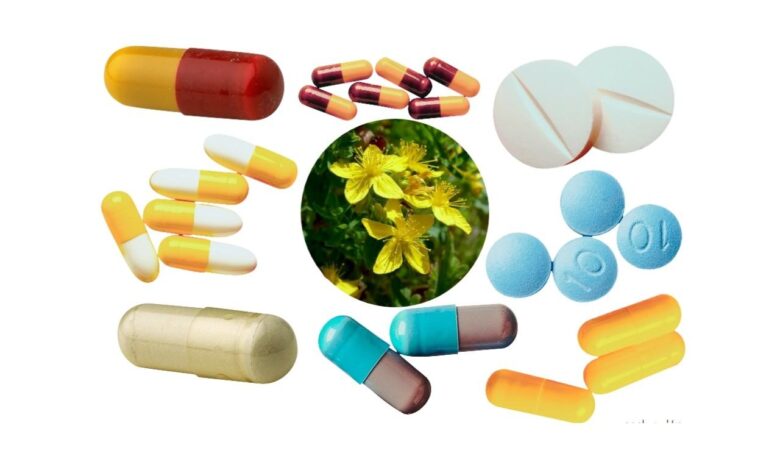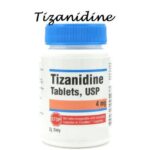List of Drugs That Can Interact With St. John’s Wort

What is drug interaction?
Drug interaction is defined as the changes in a drug’s effects due to recent or concurrent use of another drug or drugs (drug-drug interactions), ingestion of food (drug-nutrient interactions), or ingestion of dietary supplements (dietary supplement-drug interactions).
Drug interaction is one of the main subsets of medication errors that can cause various unwanted adverse reactions. The risk and severity of drug interactions depends on different factors including the number of prescribed medications, duration of treatment, patient’s age, and the stage of the disease.
What is St. John’s Wort?
St. John’s wort, scientifically known as Hypericum perforatum is a flowering shrub native to Europe. It gets its name from the fact that it often blooms on the birthday of the biblical John the Baptist.
The flowers and leaves of St. John’s wort contain active ingredients such as hyperforin. St. John’s wort is available as a supplement in teas, tablets, liquids and topical preparations. St. John’s wort has been used for medical purposes in other parts of the world for thousands of years. St. John’s wort is continually being studied to try to demonstrate its alleged benefits.
St. John’s wort has been used for centuries for mental health conditions. It’s widely prescribed for depression in Europe. St. John’s wort is sold as a dietary supplement in the United States, where the standards for selling supplements are less strict than the standards for prescription or over-the-counter drugs. The FDA classifies St. John’s wort as a dietary supplement, not a drug. Therefore, the agency doesn’t test it for safety and effectiveness.
List of Drugs and Medications That Can Interact With St. John’s Wort
According to Mayo Clinic, St. John’s wort has been associated with very serious and potentially dangerous interactions with many common drugs. The list below includes some recognized interactions. However, other drugs may also interact with St. John’s wort. Check with your doctor before using St. John’s wort in combination with any other drugs, especially prescription medications. The list of drugs that can interact with St. John’s wort include;
- Alprazolam (Xanax). Taking St. John’s wort with this drug used to relieve symptoms of anxiety might decrease the drug’s effect.
- Antidepressants. Taking St. John’s wort with antidepressants might increase the risk of the accumulation of high levels of serotonin in your body. Too much serotonin can cause mild to severe side effects. Taking this supplement and an antidepressant requires a doctor’s supervision.
- Barbiturates. Taking St. John’s wort with a drug that acts as a central nervous system depressant (barbiturate) might decrease barbiturate-induced sleep time.
- Bupropion (Wellbutrin SR, Forfivo XL). Taking St. John’s wort with this antidepressant might decrease the drug’s effect.
- Certain chemotherapy drugs. Taking St. John’s wort with irinotecan (Camptosar, Onivyde), docetaxel (Taxotere) or imatinib (Gleevec) might reduce the chemotherapy drug’s effects.
- Certain immunosuppressive drugs. Taking St. John’s wort with tacrolimus (Prograf, Astagraf XL, others) or cyclosporine (Neoral, Sandimmune, others) might decrease the drug’s effect.
- Certain statins. Taking St. John’s wort with simvastatin (Zocor, Flolipid) might reduce the drug’s effectiveness.
- Contraceptive drugs. Use of St. John’s wort with contraceptive drugs might result in breakthrough bleeding, irregular bleeding or unplanned pregnancy. An additional or alternative form of birth control might be needed.
- Cytochrome P450 1A2 (CYP1A2), Cytochrome P450 2B6 (CYP2B6), Cytochrome P450 2C19 (CYP2C19) and cytochrome P450 2C9 (CYP2C9) and cytochrome P450 3A4 (CYP3A4) substrates. Don’t take St. John’s wort if you’re taking a drug affected by these enzymes.
- Dextromethorphan. Taking St. John’s wort with this cough suppressant might increase the risk of the accumulation of high levels of serotonin in your body.
- Digoxin (Lanoxin). Taking St. John’s wort with this heart medication can reduce the drug’s effect.
- Fexofenadine (Allegra Allergy). Taking St. John’s wort with this antihistamine might cause too much of the drug to build up in your body, worsening usual side effects.
- Ketamine (Ketalar). Taking St. John’s wort with ketamine might reduce the drug’s anesthetic effect.
- Narcotics. Don’t take St. John’s wort with methadone (Methadose). Taking St. John’s wort with certain narcotics might reduce the drug’s effectiveness. Combining the supplement with narcotics might also increase narcotic-induced sleep time and painkilling effects.
- Non-nucleoside reverse transcriptase inhibitors. Taking St. John’s wort with one of these anti-HIV drugs could reduce the drug’s effect.
- Omeprazole (Prilosec). Don’t take St. John’s wort with this drug used to treat persistent heartburn. The supplement can reduce the drug’s effectiveness.
- Phenytoin (Dilantin, Phenytek). Taking St. John’s wort with this anticonvulsant might result in loss of seizure control.
- Photosensitizing drugs. Taking St. John’s wort with a drug that increases sensitivity to sunlight might increase the risk of a reaction.
- Protease inhibitors. Taking St. John’s wort with this type of antiviral drug can reduce the drug’s effectiveness.
- Triptans. Don’t take St. John’s wort with these medications used to treat migraines. The supplement might increase the risk of the accumulation of high levels of serotonin in your body. Too much serotonin can cause mild to severe side effects.
- Voriconazole. Taking St. John’s wort with this antifungal drug might reduce the drug’s effectiveness.
- Warfarin (Jantoven). Taking St. John’s wort with this drug taken to reduce blood clotting might decrease the drug’s effect.





